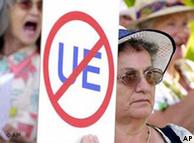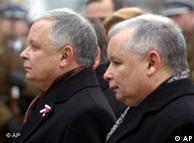nside a drab basement in a plain brown Eastpointe office building, a gift shop offers a kaleidoscope of colorful pieces of Polish folk art, Polish products and other items from the former communist country.
Polish crystal and Boleslawiec pottery. Wooden boxes and jewelry. Nesting dolls and Easter eggs. Traditional, hand-beaded vests and aprons. Antique dolls and coloring books.
he gift shop is but one small part of the American Polish Assistance Association's very local grassroots effort of international goodwill.
It starts in this office space on Gratiot near 9 Mile Road, and ends up in orphanages, schools for blind children and community centers in Poland.
Proceeds from the gift shop -- though they aren't much -- help pay for shipping costs, packing supplies and such for this shoestring-budgeted operation of volunteers. They quietly sell items from the shop and, more importantly, collect clothes, toys, toothbrushes, blankets, bikes, crutches, school supplies, linens, wheelchairs and more.
Sorting and packing of the items takes place in a large closet just off the gift shop and in another office across the hall, where boxes are stacked floor-to-ceiling in preparation for the transatlantic voyage to Poland.
The all-volunteer American Polish Assistance Association, or APAA, gathers the goods as it has since the 1960s, when it operated in a different way in a different place with different people, but for the same reason.
"We're here to help those in need," said APAA President Michael Ostrowski.
People familiar with the group bring their donations into the gift shop or leave them at collection sites so that volunteers can bring them into the gift shop, which also is part of the APAA main office.
When enough boxes, usually 700 to 800, are accumulated at the APAA's offices and in the garages and the closet of APAA volunteers, they are packed into 40-foot shipping containers and sent to Lublin, Poland, to a humanitarian organization's distribution center. Between 20 and 25 organizations, primarily ones that help children, receive the goods from this place called Michigan.
The donations arrive with precise instructions as to where they should go, as the APAA hears throughout the year from the orphanages and other organizations about what is needed.
It takes the group and its donors about six months to fill up the 40-foot containers. The most recent shipment arrived in Poland in October. The one before that left in June.
The work goes on all year. Even as the Polish donations were being gathered, the volunteers diverted their attention to victims of Hurricane Katrina by providing furniture, clothes, food and other necessities to Louisiana residents relocating to Michigan. They also sponsored a family that moved to Eastpointe, and shipped many dozens of boxes of donations down south and to the Ramada Inn in Southfield, where people displaced by Katrina were living.
"It takes people to do office work, people to sort donations, people to pick up donations, people buying things in this gift shop, people bringing in clothes and toys, people volunteering to work on our Web site; a lot of people are making an effort in different ways," Ostrowski said.
Founder Michael Krolewski died in late 2005 after building up the association to what it is today and helping it through ups, downs and many changes.
"After he was gone, everyone had to chip in a little bit more. He did so much. He was a translator, a dance instructor; he knew the history," Ostrowski said.
APAA is the latest incarnation of the group that started in the 1960s.
It was founded by direct descendants of Polish citizens who were still living under the country's totalitarian regime.
Detroit- and Hamtramck-area residents who were members of a dance ensemble called Galicja and participants in the Polish American Folk Theater tried to help their family and friends by sending small parcels of medical supplies, vitamins and clothing to village centers, churches and the Laski Hospital for Blind Children outside Warsaw.
By the 1980s, an even larger group moved the operation to the Polonia Imports store in New Baltimore and created the Polish Emergency Relief Committee.
According to APAA's Web site, Poland's Solidarity movement for freedom "began to become common knowledge in the United States and young Polish Americans felt it was their duty to help all of the people who were putting their lives on the line for freedom in the country from which so many Americans emigrated."
PERC, as it became known, sponsored cultural activities, language lessons, history classes, dance instruction and other projects to raise funds to start large-scale shipments to the country as its people strived to survive the transition to a new economy.
By the mid-1990s, with freedom established and prosperity spreading, PERC changed its name to APAA and turned its concentration to orphanages and the poor and the elderly people of village communities.
About five years ago, the group moved to Eastpointe.
"Today, we primarily help children," Ostrowski said. "It's really based on need."
The assistance has continued even as Poland has shifted from communism.
"The economy is doing better, but there still is a need," he said. "The unemployment rate in Michigan is 7%. In Poland it's something like 16% -- that's a good year."
Eleven years ago, Ostrowski, who lives in Oxford, visited a distant relative in Poland. After he returned, he sent her about $70 to help out.
She sent a note that made it clear how grateful, excited and moved she was by the gesture.
"She said she used it to buy a cartload of coal," he said. "That put it into perspective for me."
Once he became president of APAA, after volunteering with the group for about five years, he saw how much hard work went into sending the group's grand-scale gesture, and he wanted to visit Poland to make sure the work was really needed and appreciated.
In September he visited many of the places that use the donated goods.
"I asked each one specifically, 'Is it really worthwhile?' It was a definitive 'Yes.' I asked, 'Are we sending too many things, things you don't need, clothes they don't want?' They all said, 'Please keep sending.' "
Alex Krinos of Eastpointe volunteers at the gift shop and collection center four days a week. He was friends with the founder and around when it all started.
"It was on a much smaller scale ... We are trying to do more," Krinos said.
Krinos said how much he appreciates the expression of thanks from the beneficiaries, including a recent letter and photo of a teenage girl smiling from her donated electric wheelchair.
Along with Krinos, Phyllis Day of St. Clair Shores and Leonard Motyka of Warren are regular Saturday workers at the gift shop. Saturday also is a busy donation day.
Jerry Sielagoski, a St. Clair Shores resident and APAA vice president, arrived last Saturday with donations collected from fellow members at St. Hyacinth church in Detroit. Day -- who had just been gushing about the sweetness and cuteness of baby clothes waiting to go into a donation box -- sounded as if the just-arrived donations were her first such experience.
"Oh, this is wonderful. Leonard, this is going to be fun," she said as she prepared to start emptying the bags and boxes that will likely leave in early summer.
Source:By KIM NORTH SHINE, freep.com,





